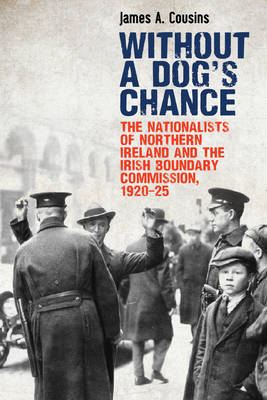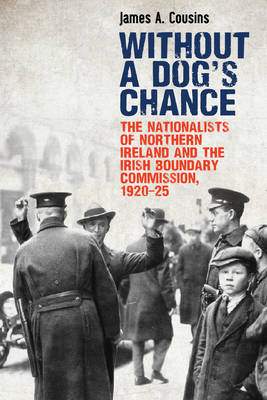
Door een staking bij bpost kan je online bestelling op dit moment iets langer onderweg zijn dan voorzien. Dringend iets nodig? Onze winkels ontvangen jou met open armen!
- Afhalen na 1 uur in een winkel met voorraad
- Gratis thuislevering in België vanaf € 30
- Ruim aanbod met 7 miljoen producten
Door een staking bij bpost kan je online bestelling op dit moment iets langer onderweg zijn dan voorzien. Dringend iets nodig? Onze winkels ontvangen jou met open armen!
- Afhalen na 1 uur in een winkel met voorraad
- Gratis thuislevering in België vanaf € 30
- Ruim aanbod met 7 miljoen producten
Zoeken
Without a Dog's Chance
The Nationalists of Northern Ireland and the Irish Boundary Commission, 1920-1925
James Cousins
Paperback | Engels
€ 39,95
+ 79 punten
Omschrijving
Covering the years 1920-1925, Without a Dog's Chance is the first major study of Northern nationalists' role in the Boundary Commission that they, and their allies in the Irish Free State, had hoped to use to end partition and destroy the new Northern state. For Northern nationalists, the partition of Ireland was an intensely traumatic event, not only because it consigned almost half a million nationalists to a government that was not of their choosing, but also because they regarded partition as the mutilation of their Irish citizenship and nationhood. Without a Dog's Chance fills an important gap in the history of this period by focusing on the complex relationship between partition-era Northern and Southern nationalism, and the subordinate role Northern nationalists had in Ireland's post-partition political landscape. Feeling under-valued, abandoned and exploited by their peers in the South, Northern nationalists were also radically marginalised within the new Northern Irish state, which regarded them with fear and suspicion. With December 2020 marking one hundred years since partition, this timely book is essential reading.
Specificaties
Betrokkenen
- Auteur(s):
- Uitgeverij:
Inhoud
- Aantal bladzijden:
- 380
- Taal:
- Engels
Eigenschappen
- Productcode (EAN):
- 9781788551021
- Verschijningsdatum:
- 1/03/2020
- Uitvoering:
- Paperback
- Formaat:
- Trade paperback (VS)
- Afmetingen:
- 157 mm x 231 mm
- Gewicht:
- 544 g

Alleen bij Standaard Boekhandel
+ 79 punten op je klantenkaart van Standaard Boekhandel
Beoordelingen
We publiceren alleen reviews die voldoen aan de voorwaarden voor reviews. Bekijk onze voorwaarden voor reviews.











